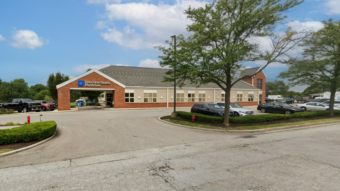Dancing and singing along with the crowd at a Thalia Hall concert. Ignoring the tight quarters and laughing at a Second City revue. Joining hundreds of others at the Goodman’s annual staging of A Christmas Carol. These are quintessential Chicago experiences, yet they seem almost anachronistic given the times we are in.
Among the industries in which COVID-19 has sown chaos, few can claim as much injury as the entertainment sector. Movie houses, music halls, comedy clubs, theaters and other entertainment destinations have for the most part gone dark due to social distancing measures. But that’s not to say that all such venues are quiet.
When the Immersive Van Gogh exhibit was looking for a space, they turned to Lee Dickson, who was recently named managing director leading the entertainment practice at Baum Realty Group. The digital art exhibit had a number of venue requirements, including a 25,000-square-foot footprint with 25-foot ceilings at a minimum. Ultimately, she aided their move into the landmark Germania Club in Chicago’s Gold Coast.

“There aren’t a lot of spaces like that in the city, so it was like finding a needle in a haystack,” Dickson said. “I was able to find the right needle in the right haystack, but it’s not as if there were 20 places for them to choose from.”
Dickson focuses on fulfilling the often-unusual requirements of entertainment, restaurant and event clients. While these operations may have peculiar asks in typical years, in 2020 they are more focused on staying afloat, especially the numerous small venues around the city.
Another recent client of Dickson’s was Cards Against Humanity, who opened a gaming bar within the former Margie’s Candies building in Logan Square. They were open for approximately six weeks when the pandemic hit. Dickson was able to negotiate a six-month deferral on their rent, with an additional six months added on to the end of their existing lease. This blend-and-extend model is, to her mind, the ideal avenue for small entertainment operators struggling in the midst of the pandemic.
“If people are smart, they would certainly do that. You don’t want to be put out of a space if that’s the perfect venue for you,” said Dickson. “You’re only going to have to go out and try to find it again and they’re not that easy to find.”
It’s fitting, given the industry they operate in, that these venues have found creative ways to maintain revenue flow during the pandemic. The Music Box Theater, for example, launched a slate of drive-in movies. The Museum of Contemporary Art Chicago sponsored an interactive, geographically based audio work by Jeannette Andrews where participants can go to one of four Chicago parks where their movements activate sonic expressions. These and other examples of bringing art to the masses in unconventional ways may be part of the norm moving forward.
“I don’t know that the subscription ticket model where you sit in the same seat on the second Thursday of the month is necessarily going to be what you do,” said Dickson. “There’s been an evolution of different people coming up with different types of production. It doesn’t have to be something that’s on a stage and you sit in a chair and watch it.”
While there may be new and unique performance methodologies in a post-pandemic world, theaters aren’t going anywhere. The large companies are going to have to find a way to safely seat hundreds of spectators. Following wide vaccine rollout, social distancing will likely not stick around, but concert- and theater-goers will still be cognizant of taking in a performance while surrounded by hundreds of strangers. In these cases, robust HVAC equipment on par with healthcare facilities can put patrons at ease.
Whatever shapes the future of entertainment venues may take, Dickson feels that—even in the midst of the pandemic—now is an interesting time to be doing the work that she does. She thinks the entertainment sector will bounce back fast and she wants to hit the ground running.
“I think that there’s so much opportunity in Chicago right now,” Dickson said. “I don’t see it as ‘oh woe is me.’ I just see a lot of exciting things that are happening right now.”




